Ideological and Value Analysis of Health Policy
VerifiedAdded on 2022/08/30
|8
|1667
|17
AI Summary
Contribute Materials
Your contribution can guide someone’s learning journey. Share your
documents today.
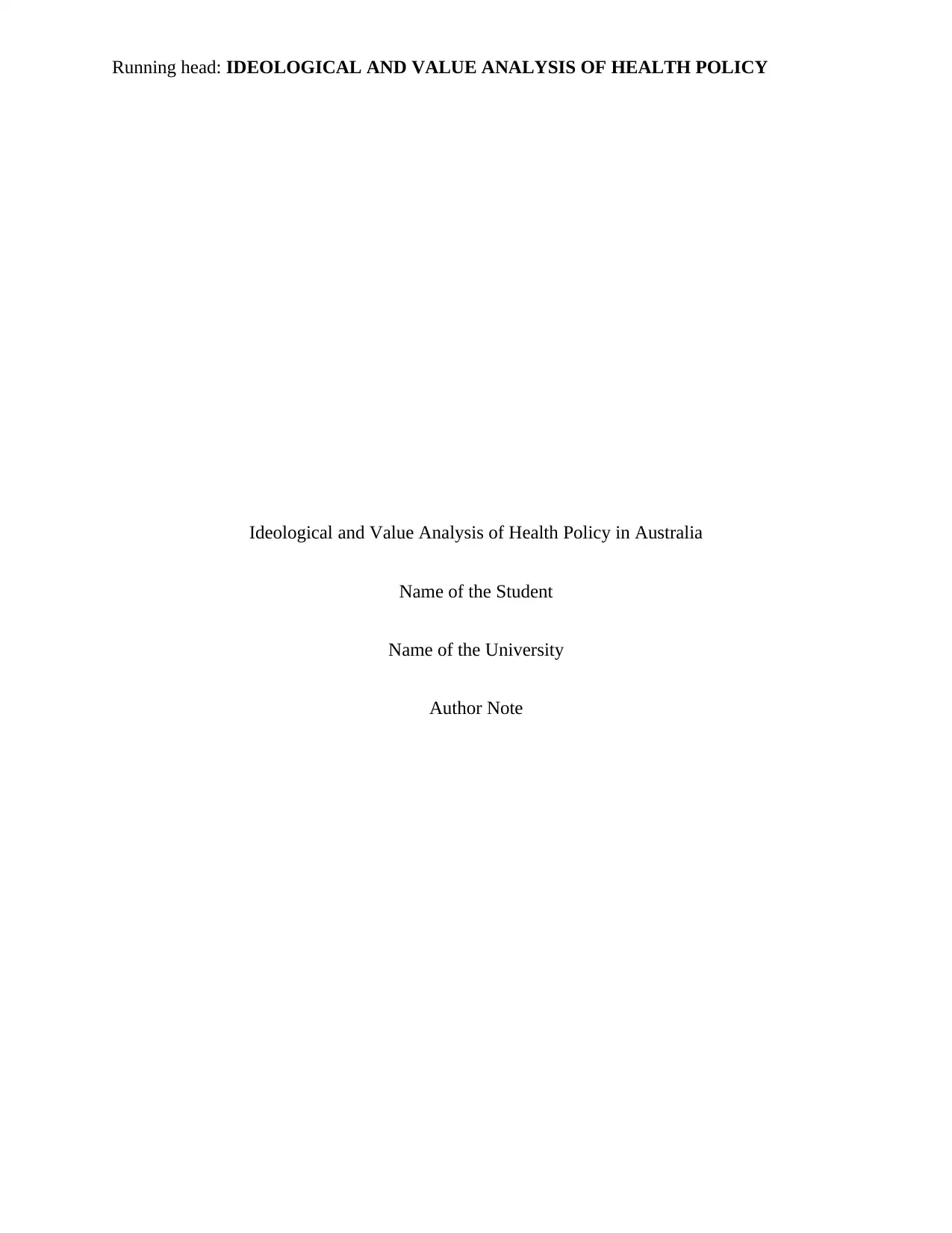
Running head: IDEOLOGICAL AND VALUE ANALYSIS OF HEALTH POLICY
Ideological and Value Analysis of Health Policy in Australia
Name of the Student
Name of the University
Author Note
Ideological and Value Analysis of Health Policy in Australia
Name of the Student
Name of the University
Author Note
Secure Best Marks with AI Grader
Need help grading? Try our AI Grader for instant feedback on your assignments.
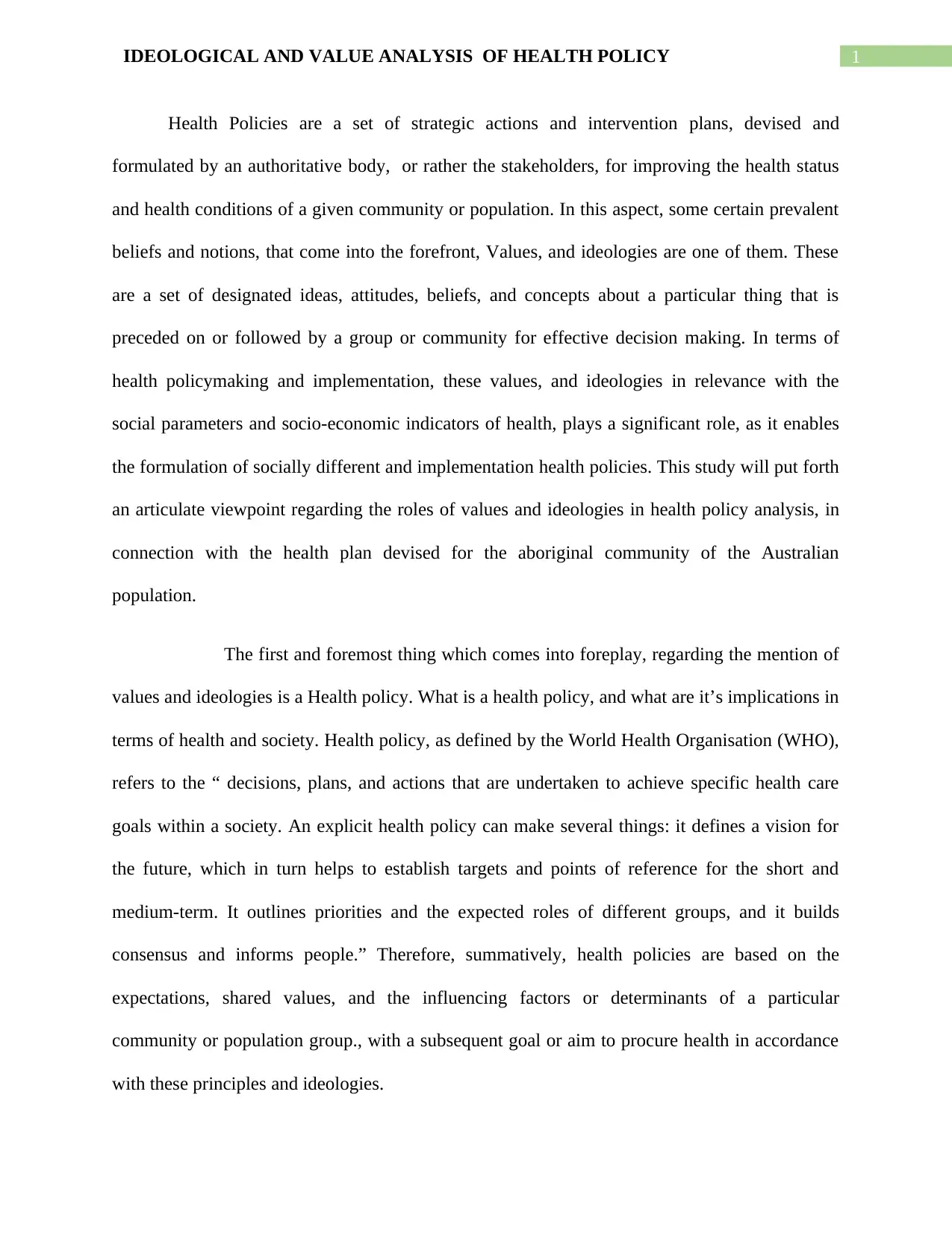
1IDEOLOGICAL AND VALUE ANALYSIS OF HEALTH POLICY
Health Policies are a set of strategic actions and intervention plans, devised and
formulated by an authoritative body, or rather the stakeholders, for improving the health status
and health conditions of a given community or population. In this aspect, some certain prevalent
beliefs and notions, that come into the forefront, Values, and ideologies are one of them. These
are a set of designated ideas, attitudes, beliefs, and concepts about a particular thing that is
preceded on or followed by a group or community for effective decision making. In terms of
health policymaking and implementation, these values, and ideologies in relevance with the
social parameters and socio-economic indicators of health, plays a significant role, as it enables
the formulation of socially different and implementation health policies. This study will put forth
an articulate viewpoint regarding the roles of values and ideologies in health policy analysis, in
connection with the health plan devised for the aboriginal community of the Australian
population.
The first and foremost thing which comes into foreplay, regarding the mention of
values and ideologies is a Health policy. What is a health policy, and what are it’s implications in
terms of health and society. Health policy, as defined by the World Health Organisation (WHO),
refers to the “ decisions, plans, and actions that are undertaken to achieve specific health care
goals within a society. An explicit health policy can make several things: it defines a vision for
the future, which in turn helps to establish targets and points of reference for the short and
medium-term. It outlines priorities and the expected roles of different groups, and it builds
consensus and informs people.” Therefore, summatively, health policies are based on the
expectations, shared values, and the influencing factors or determinants of a particular
community or population group., with a subsequent goal or aim to procure health in accordance
with these principles and ideologies.
Health Policies are a set of strategic actions and intervention plans, devised and
formulated by an authoritative body, or rather the stakeholders, for improving the health status
and health conditions of a given community or population. In this aspect, some certain prevalent
beliefs and notions, that come into the forefront, Values, and ideologies are one of them. These
are a set of designated ideas, attitudes, beliefs, and concepts about a particular thing that is
preceded on or followed by a group or community for effective decision making. In terms of
health policymaking and implementation, these values, and ideologies in relevance with the
social parameters and socio-economic indicators of health, plays a significant role, as it enables
the formulation of socially different and implementation health policies. This study will put forth
an articulate viewpoint regarding the roles of values and ideologies in health policy analysis, in
connection with the health plan devised for the aboriginal community of the Australian
population.
The first and foremost thing which comes into foreplay, regarding the mention of
values and ideologies is a Health policy. What is a health policy, and what are it’s implications in
terms of health and society. Health policy, as defined by the World Health Organisation (WHO),
refers to the “ decisions, plans, and actions that are undertaken to achieve specific health care
goals within a society. An explicit health policy can make several things: it defines a vision for
the future, which in turn helps to establish targets and points of reference for the short and
medium-term. It outlines priorities and the expected roles of different groups, and it builds
consensus and informs people.” Therefore, summatively, health policies are based on the
expectations, shared values, and the influencing factors or determinants of a particular
community or population group., with a subsequent goal or aim to procure health in accordance
with these principles and ideologies.
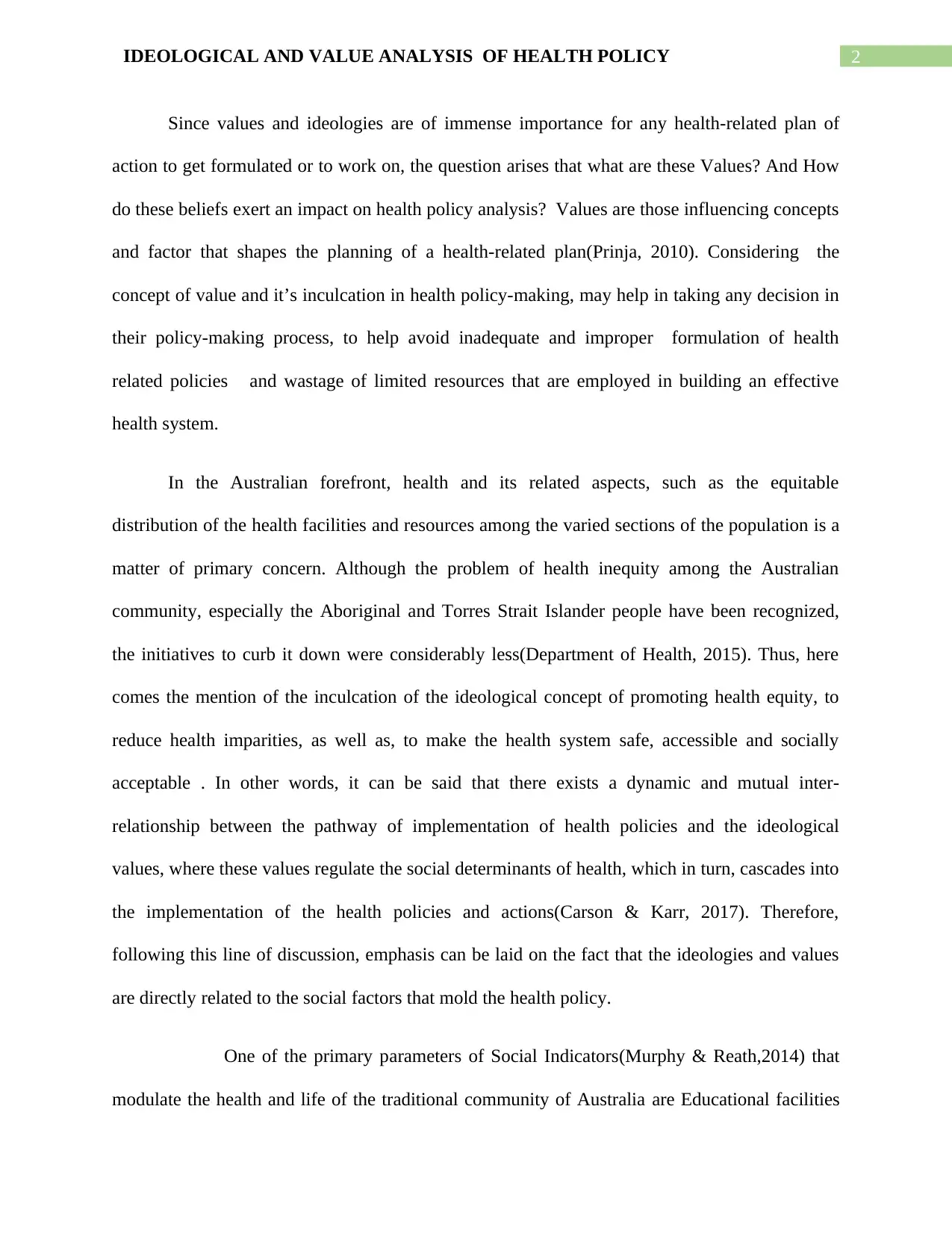
2IDEOLOGICAL AND VALUE ANALYSIS OF HEALTH POLICY
Since values and ideologies are of immense importance for any health-related plan of
action to get formulated or to work on, the question arises that what are these Values? And How
do these beliefs exert an impact on health policy analysis? Values are those influencing concepts
and factor that shapes the planning of a health-related plan(Prinja, 2010). Considering the
concept of value and it’s inculcation in health policy-making, may help in taking any decision in
their policy-making process, to help avoid inadequate and improper formulation of health
related policies and wastage of limited resources that are employed in building an effective
health system.
In the Australian forefront, health and its related aspects, such as the equitable
distribution of the health facilities and resources among the varied sections of the population is a
matter of primary concern. Although the problem of health inequity among the Australian
community, especially the Aboriginal and Torres Strait Islander people have been recognized,
the initiatives to curb it down were considerably less(Department of Health, 2015). Thus, here
comes the mention of the inculcation of the ideological concept of promoting health equity, to
reduce health imparities, as well as, to make the health system safe, accessible and socially
acceptable . In other words, it can be said that there exists a dynamic and mutual inter-
relationship between the pathway of implementation of health policies and the ideological
values, where these values regulate the social determinants of health, which in turn, cascades into
the implementation of the health policies and actions(Carson & Karr, 2017). Therefore,
following this line of discussion, emphasis can be laid on the fact that the ideologies and values
are directly related to the social factors that mold the health policy.
One of the primary parameters of Social Indicators(Murphy & Reath,2014) that
modulate the health and life of the traditional community of Australia are Educational facilities
Since values and ideologies are of immense importance for any health-related plan of
action to get formulated or to work on, the question arises that what are these Values? And How
do these beliefs exert an impact on health policy analysis? Values are those influencing concepts
and factor that shapes the planning of a health-related plan(Prinja, 2010). Considering the
concept of value and it’s inculcation in health policy-making, may help in taking any decision in
their policy-making process, to help avoid inadequate and improper formulation of health
related policies and wastage of limited resources that are employed in building an effective
health system.
In the Australian forefront, health and its related aspects, such as the equitable
distribution of the health facilities and resources among the varied sections of the population is a
matter of primary concern. Although the problem of health inequity among the Australian
community, especially the Aboriginal and Torres Strait Islander people have been recognized,
the initiatives to curb it down were considerably less(Department of Health, 2015). Thus, here
comes the mention of the inculcation of the ideological concept of promoting health equity, to
reduce health imparities, as well as, to make the health system safe, accessible and socially
acceptable . In other words, it can be said that there exists a dynamic and mutual inter-
relationship between the pathway of implementation of health policies and the ideological
values, where these values regulate the social determinants of health, which in turn, cascades into
the implementation of the health policies and actions(Carson & Karr, 2017). Therefore,
following this line of discussion, emphasis can be laid on the fact that the ideologies and values
are directly related to the social factors that mold the health policy.
One of the primary parameters of Social Indicators(Murphy & Reath,2014) that
modulate the health and life of the traditional community of Australia are Educational facilities
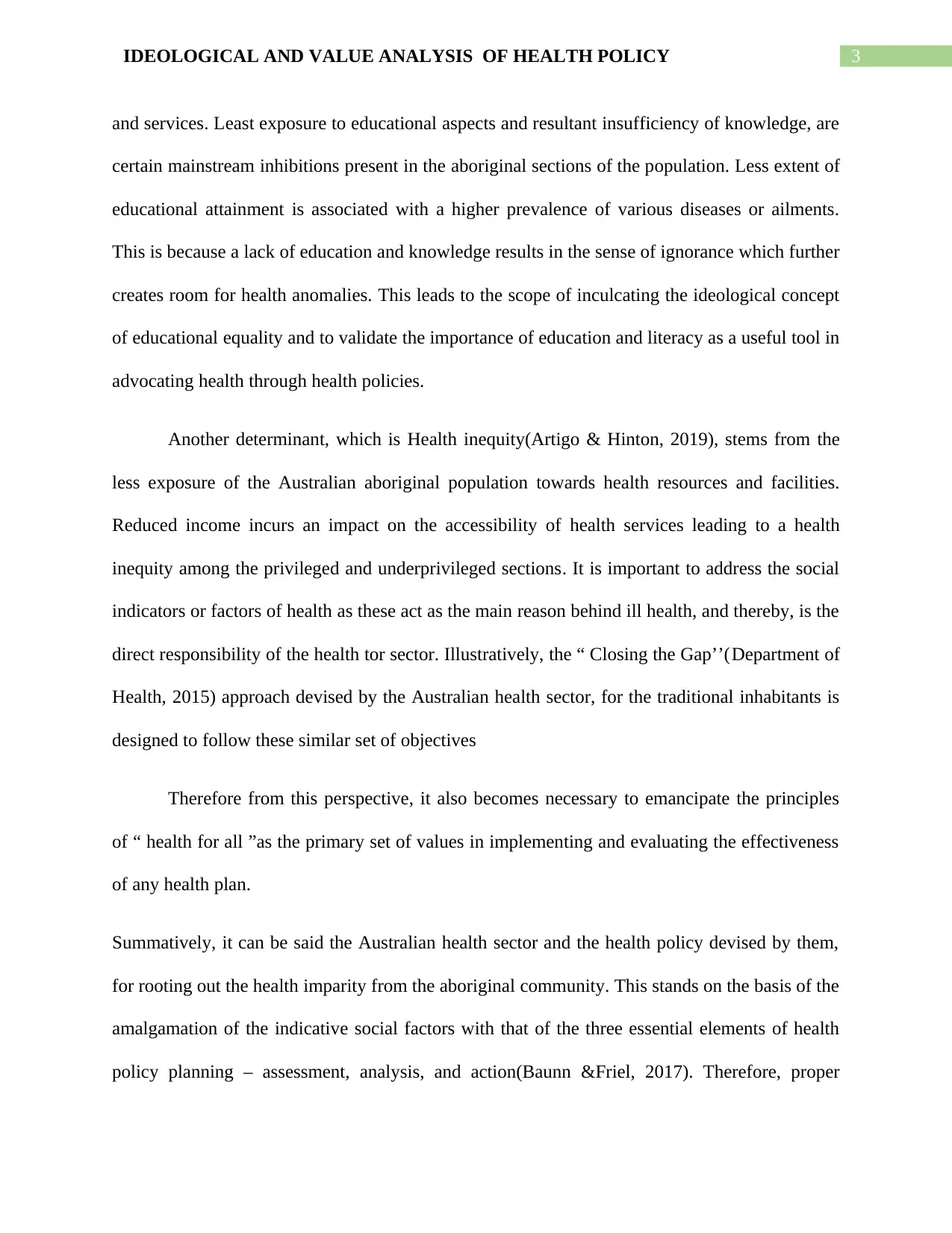
3IDEOLOGICAL AND VALUE ANALYSIS OF HEALTH POLICY
and services. Least exposure to educational aspects and resultant insufficiency of knowledge, are
certain mainstream inhibitions present in the aboriginal sections of the population. Less extent of
educational attainment is associated with a higher prevalence of various diseases or ailments.
This is because a lack of education and knowledge results in the sense of ignorance which further
creates room for health anomalies. This leads to the scope of inculcating the ideological concept
of educational equality and to validate the importance of education and literacy as a useful tool in
advocating health through health policies.
Another determinant, which is Health inequity(Artigo & Hinton, 2019), stems from the
less exposure of the Australian aboriginal population towards health resources and facilities.
Reduced income incurs an impact on the accessibility of health services leading to a health
inequity among the privileged and underprivileged sections. It is important to address the social
indicators or factors of health as these act as the main reason behind ill health, and thereby, is the
direct responsibility of the health tor sector. Illustratively, the “ Closing the Gap’’(Department of
Health, 2015) approach devised by the Australian health sector, for the traditional inhabitants is
designed to follow these similar set of objectives
Therefore from this perspective, it also becomes necessary to emancipate the principles
of “ health for all ”as the primary set of values in implementing and evaluating the effectiveness
of any health plan.
Summatively, it can be said the Australian health sector and the health policy devised by them,
for rooting out the health imparity from the aboriginal community. This stands on the basis of the
amalgamation of the indicative social factors with that of the three essential elements of health
policy planning – assessment, analysis, and action(Baunn &Friel, 2017). Therefore, proper
and services. Least exposure to educational aspects and resultant insufficiency of knowledge, are
certain mainstream inhibitions present in the aboriginal sections of the population. Less extent of
educational attainment is associated with a higher prevalence of various diseases or ailments.
This is because a lack of education and knowledge results in the sense of ignorance which further
creates room for health anomalies. This leads to the scope of inculcating the ideological concept
of educational equality and to validate the importance of education and literacy as a useful tool in
advocating health through health policies.
Another determinant, which is Health inequity(Artigo & Hinton, 2019), stems from the
less exposure of the Australian aboriginal population towards health resources and facilities.
Reduced income incurs an impact on the accessibility of health services leading to a health
inequity among the privileged and underprivileged sections. It is important to address the social
indicators or factors of health as these act as the main reason behind ill health, and thereby, is the
direct responsibility of the health tor sector. Illustratively, the “ Closing the Gap’’(Department of
Health, 2015) approach devised by the Australian health sector, for the traditional inhabitants is
designed to follow these similar set of objectives
Therefore from this perspective, it also becomes necessary to emancipate the principles
of “ health for all ”as the primary set of values in implementing and evaluating the effectiveness
of any health plan.
Summatively, it can be said the Australian health sector and the health policy devised by them,
for rooting out the health imparity from the aboriginal community. This stands on the basis of the
amalgamation of the indicative social factors with that of the three essential elements of health
policy planning – assessment, analysis, and action(Baunn &Friel, 2017). Therefore, proper
Secure Best Marks with AI Grader
Need help grading? Try our AI Grader for instant feedback on your assignments.
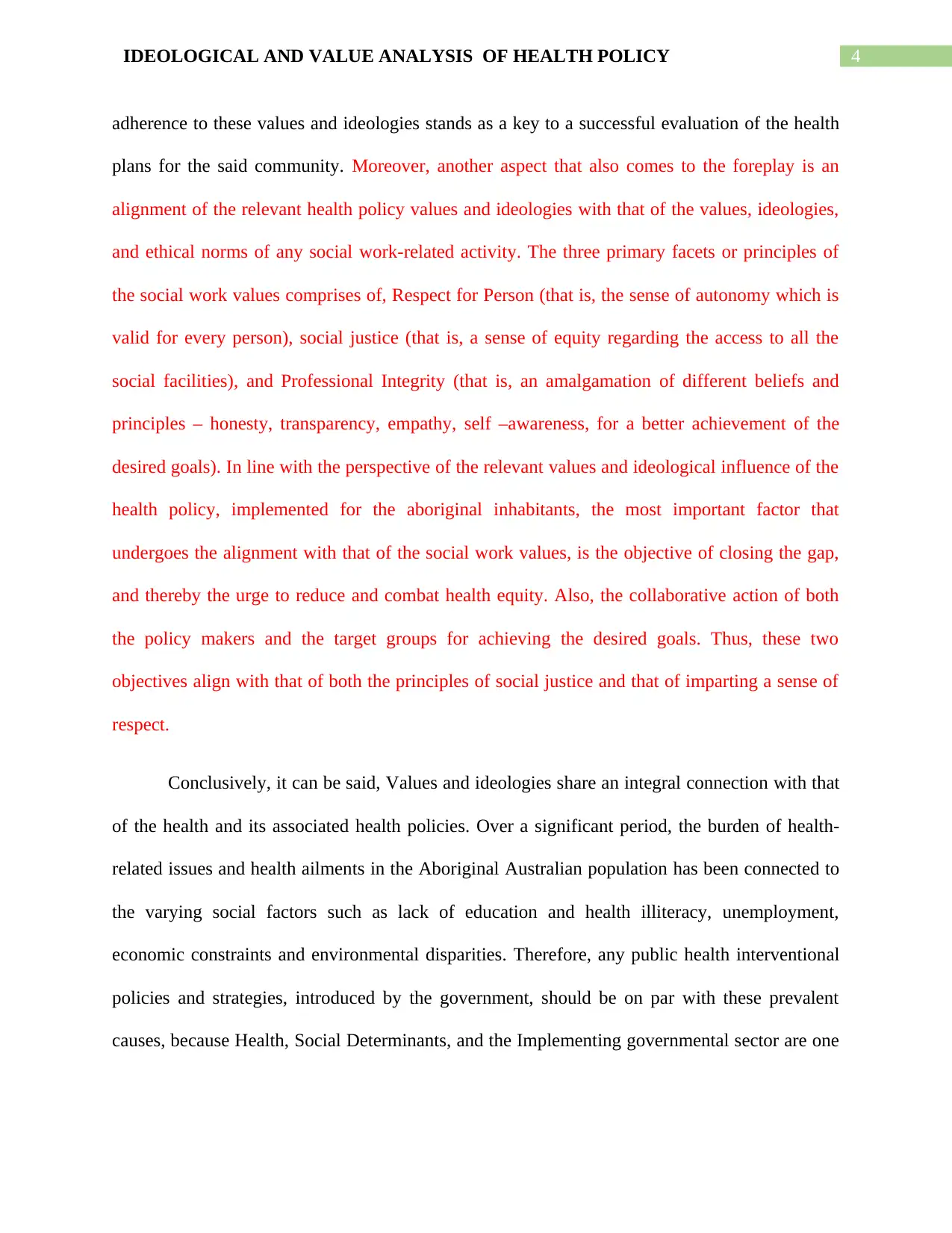
4IDEOLOGICAL AND VALUE ANALYSIS OF HEALTH POLICY
adherence to these values and ideologies stands as a key to a successful evaluation of the health
plans for the said community. Moreover, another aspect that also comes to the foreplay is an
alignment of the relevant health policy values and ideologies with that of the values, ideologies,
and ethical norms of any social work-related activity. The three primary facets or principles of
the social work values comprises of, Respect for Person (that is, the sense of autonomy which is
valid for every person), social justice (that is, a sense of equity regarding the access to all the
social facilities), and Professional Integrity (that is, an amalgamation of different beliefs and
principles – honesty, transparency, empathy, self –awareness, for a better achievement of the
desired goals). In line with the perspective of the relevant values and ideological influence of the
health policy, implemented for the aboriginal inhabitants, the most important factor that
undergoes the alignment with that of the social work values, is the objective of closing the gap,
and thereby the urge to reduce and combat health equity. Also, the collaborative action of both
the policy makers and the target groups for achieving the desired goals. Thus, these two
objectives align with that of both the principles of social justice and that of imparting a sense of
respect.
Conclusively, it can be said, Values and ideologies share an integral connection with that
of the health and its associated health policies. Over a significant period, the burden of health-
related issues and health ailments in the Aboriginal Australian population has been connected to
the varying social factors such as lack of education and health illiteracy, unemployment,
economic constraints and environmental disparities. Therefore, any public health interventional
policies and strategies, introduced by the government, should be on par with these prevalent
causes, because Health, Social Determinants, and the Implementing governmental sector are one
adherence to these values and ideologies stands as a key to a successful evaluation of the health
plans for the said community. Moreover, another aspect that also comes to the foreplay is an
alignment of the relevant health policy values and ideologies with that of the values, ideologies,
and ethical norms of any social work-related activity. The three primary facets or principles of
the social work values comprises of, Respect for Person (that is, the sense of autonomy which is
valid for every person), social justice (that is, a sense of equity regarding the access to all the
social facilities), and Professional Integrity (that is, an amalgamation of different beliefs and
principles – honesty, transparency, empathy, self –awareness, for a better achievement of the
desired goals). In line with the perspective of the relevant values and ideological influence of the
health policy, implemented for the aboriginal inhabitants, the most important factor that
undergoes the alignment with that of the social work values, is the objective of closing the gap,
and thereby the urge to reduce and combat health equity. Also, the collaborative action of both
the policy makers and the target groups for achieving the desired goals. Thus, these two
objectives align with that of both the principles of social justice and that of imparting a sense of
respect.
Conclusively, it can be said, Values and ideologies share an integral connection with that
of the health and its associated health policies. Over a significant period, the burden of health-
related issues and health ailments in the Aboriginal Australian population has been connected to
the varying social factors such as lack of education and health illiteracy, unemployment,
economic constraints and environmental disparities. Therefore, any public health interventional
policies and strategies, introduced by the government, should be on par with these prevalent
causes, because Health, Social Determinants, and the Implementing governmental sector are one

5IDEOLOGICAL AND VALUE ANALYSIS OF HEALTH POLICY
and integral unit. And this is where the influence of the values and ideologies remains intact and
comes to the foreplay.
and integral unit. And this is where the influence of the values and ideologies remains intact and
comes to the foreplay.
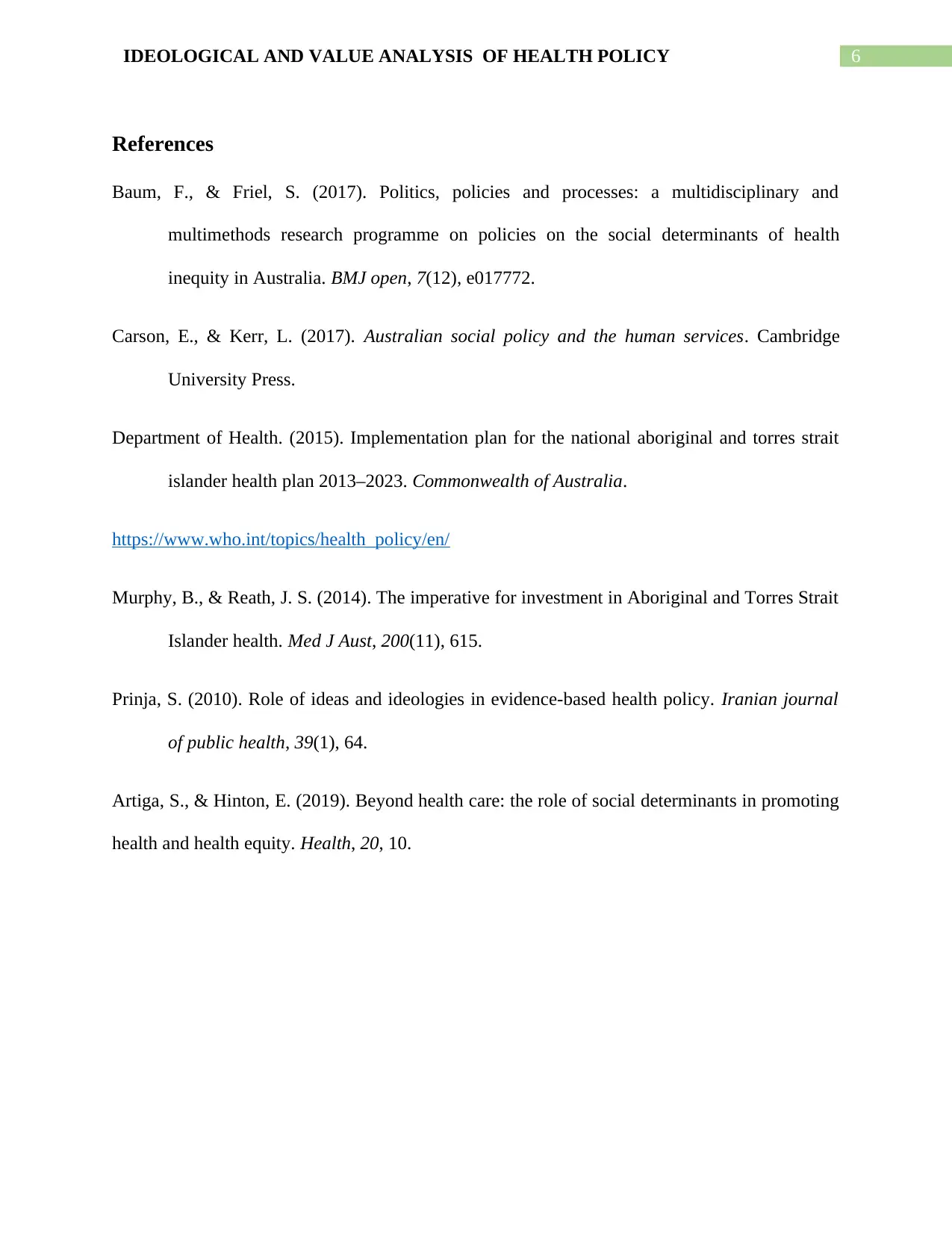
6IDEOLOGICAL AND VALUE ANALYSIS OF HEALTH POLICY
References
Baum, F., & Friel, S. (2017). Politics, policies and processes: a multidisciplinary and
multimethods research programme on policies on the social determinants of health
inequity in Australia. BMJ open, 7(12), e017772.
Carson, E., & Kerr, L. (2017). Australian social policy and the human services. Cambridge
University Press.
Department of Health. (2015). Implementation plan for the national aboriginal and torres strait
islander health plan 2013–2023. Commonwealth of Australia.
https://www.who.int/topics/health_policy/en/
Murphy, B., & Reath, J. S. (2014). The imperative for investment in Aboriginal and Torres Strait
Islander health. Med J Aust, 200(11), 615.
Prinja, S. (2010). Role of ideas and ideologies in evidence-based health policy. Iranian journal
of public health, 39(1), 64.
Artiga, S., & Hinton, E. (2019). Beyond health care: the role of social determinants in promoting
health and health equity. Health, 20, 10.
References
Baum, F., & Friel, S. (2017). Politics, policies and processes: a multidisciplinary and
multimethods research programme on policies on the social determinants of health
inequity in Australia. BMJ open, 7(12), e017772.
Carson, E., & Kerr, L. (2017). Australian social policy and the human services. Cambridge
University Press.
Department of Health. (2015). Implementation plan for the national aboriginal and torres strait
islander health plan 2013–2023. Commonwealth of Australia.
https://www.who.int/topics/health_policy/en/
Murphy, B., & Reath, J. S. (2014). The imperative for investment in Aboriginal and Torres Strait
Islander health. Med J Aust, 200(11), 615.
Prinja, S. (2010). Role of ideas and ideologies in evidence-based health policy. Iranian journal
of public health, 39(1), 64.
Artiga, S., & Hinton, E. (2019). Beyond health care: the role of social determinants in promoting
health and health equity. Health, 20, 10.
Paraphrase This Document
Need a fresh take? Get an instant paraphrase of this document with our AI Paraphraser

7IDEOLOGICAL AND VALUE ANALYSIS OF HEALTH POLICY
.
.
1 out of 8
Related Documents
Your All-in-One AI-Powered Toolkit for Academic Success.
+13062052269
info@desklib.com
Available 24*7 on WhatsApp / Email
![[object Object]](/_next/static/media/star-bottom.7253800d.svg)
Unlock your academic potential
© 2024 | Zucol Services PVT LTD | All rights reserved.





